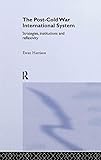The post-Cold War international system : strategies, institutions, and reflexivity / Ewan Harrison.
Material type: TextSeries: New international relationsPublication details: London : Routledge, 2004Description: xxii, 173 p. : ill. ; 24 cmISBN: 0415328365 (hbk.); 9780415328364 (hbk.); 0415429749 (pbk.); 9780415429740 (pbk.)Subject(s): International relations | World politics -- 1989-DDC classification: 327/.09/049 LOC classification: JZ1305 | .H37 2004Online resources: Table of contents only | Publisher description
TextSeries: New international relationsPublication details: London : Routledge, 2004Description: xxii, 173 p. : ill. ; 24 cmISBN: 0415328365 (hbk.); 9780415328364 (hbk.); 0415429749 (pbk.); 9780415429740 (pbk.)Subject(s): International relations | World politics -- 1989-DDC classification: 327/.09/049 LOC classification: JZ1305 | .H37 2004Online resources: Table of contents only | Publisher description | Item type | Current library | Collection | Call number | Copy number | Status | Date due | Barcode |
|---|---|---|---|---|---|---|---|
 Book
Book
|
University of Macedonia Library Βιβλιοστάσιο Α (Stack Room A) | Main Collection | JZ1305.H37 2004 (Browse shelf (Opens below)) | 1 | Available | 0013107604 |
Includes bibliographical references (p. [149]-165) and index.
Introduction -- Reassessing the logic of anarchy : rationality versus reflexivity -- German foreign policy after the Cold War -- Japanese foreign policy after the Cold War -- Chinese foreign policy after the Cold War -- Conclusions -- Postscript : September 11, 2001and its aftermath.
"The end of the Cold War has opened up a 'real world laboratory' in which to test and refine general theories of international relations. Using the frameworks provided by structural realism, institutionalism and liberalism, this book examines how major powers responded to the collapse of the Soviet Union and developed their foreign policies over the period of post-Cold War transition. This book argues that the democratic peace has begun to generate powerful socialization effects, due to the emergence of a critical mass of liberal democratic states since the end of the Cold War. The trend this has produced is similar to a pattern that classical realists have interpreted as 'bandwagoning' within a unipolar power structure. Case studies of Germany, China and Japan - identified as key states with the potential to challenge US dominance - provide evidence to support the assessment of international change. The author concludes by exploring the implications of September 11 for the analysis developed. This important volume argues that the end of the Cold War was a major historical turning point in the development of world politics with fundamental implications for the basic way in which the dynamics of the international system are conceptualized." -- Cover.





There are no comments on this title.